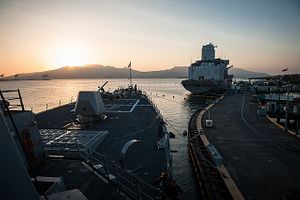News reports last week that Philippine prosecutors will charge U.S. Marine Private First Class Joseph Pemberton for the murder of Jennifer Laude come at a critical moment. As the U.S. and Philippine militaries edge closer together following the adoption of an Enhanced Defense Cooperation Agreement this April, Filipinos fear a return to the violent crimes and diplomatic high-handedness that accompanied the massive U.S. military presence during the Cold War. Laude’s killing – and America’s initial handling of the case – suggest that history is repeating itself. It doesn’t have to, although it is up to U.S. officials to make sure that it doesn’t.
On Saturday, October 11, the 19-year-old Pemberton checked into an Olongapo hotel with 26-year-old Laude, whom he had met in one of the nightclubs that line Magsaysay Street in Olongapo, 120 kilometers from Manila and adjacent to the former U.S. naval station at Subic Bay. Pemberton exited the hotel less than an hour later; staff soon found Laude’s body, strangled and left in a bathroom. The marine told a friend that he had attacked Laude after discovering she was a transwoman: “I think I killed a he/she,” he admitted. Pemberton was immediately taken into custody – not by Philippine civilian police but by the U.S. military. And that’s where the diplomatic problems began.
Pemberton – who is reportedly in U.S. custody and slated for transferal to the American embassy – is hardly the first U.S. Marine to make headlines in Manila. In 1947, one year after the U.S. granted independence to the Philippines, the two countries signed a Military Bases Agreement (MBA) that gave U.S. soldiers near-total exemption from Philippine criminal jurisdiction. As wars in Korea and Vietnam brought tens of thousands of Americans to military bases in Asia, soldiers’ crimes ranged from theft and extortion to traffic accidents, shootings, and rapes. Before the accused could face what one American journalist dismissed in 1957 as “Asian justice,” military officers routinely shuttled them out of the country and beyond the reach of Philippine authorities. The systematic exploitation of Filipina women in the euphemistically named “rest and recreation” industries in offbase communities added fuel to the fire. Violations of sovereignty and dignity brewed resentment and anti-Americanism. In 1991, in the wake of the People Power revolution that overthrew the Marcos regime, the Philippine Senate voted not to renew the MBA.
Across Asia, however, high-profile incidents continued to complicate diplomatic relations: the murder and rape of a South Korean sex worker in 1991 prompted calls for U.S. troop withdrawal; the gang rape of a 12-year-old girl in Okinawa by U.S. Marines in 1995 still casts a shadow over base negotiations between the U.S. and Japan. Nor did much change in the Philippines even after the MBA. Accusations of the 2005 rape in Olongapo of a woman known as “Nicole” led to a media spectacle and the conviction (later exonerated) of U.S. Marine Lance Corporal Daniel Smith. Nicole’s lawyer, Harry Roque, is now representing the Laude family. Little wonder that the San Francisco-based newspaper FilAm Star recently observed that “a sense of déjà-vu pervades the air.”
But much has changed, on both sides of the Pacific. In November 2011, then-U.S. Secretary of State Hilary Clinton announced a U.S. “pivot toward Asia,” and while Filipinos, wary of Chinese intentions in Southeast Asia, have nervously welcomed the extended relations, it is the U.S. that needs Philippine cooperation right now. Together with the 1999 Visiting Forces Agreement (VFA), new protocols promise to extend joint training exercises like the one that brought PFC Pemberton and the U.S.S. Peleliu to Subic this October. Activists have challenged the EDCA in the Philippine Supreme Court, and protestors urge the government to “Junk the VFA,” but the VFA probably isn’t going anywhere and the number of U.S. service personnel in country is likely only to increase.
Charging Pemberton in a Philippine court is an important first step. But if he is convicted, he should face justice there as well. A decade ago, after the “Nicole” trial, U.S. officials whisked Daniel Smith out of the country, and recent protestors in Olongapo bearing placards reading “Don’t let Pemberton become another Smith!” have not forgotten that. Nor should Americans. The U.S. cites the VFA while insisting on custody of Pemberton. But although Article V of the VFA allows the U.S. to claim custody, it does not require it to do so, especially if the Philippines requests custody and jurisdiction. Stubbornness and legalism will only confirm Filipinos’ worst suspicions, and will do little to bring Laude’s killer to justice.
By pursuing a charge of murder rather than homicide, Olongapo’s prosecutor Emiline Delos Santos is gambling (and, perhaps, grandstanding for Manila newspapers). Whether the charge sticks remains to be seen. Just as unclear is whether the Obama administration’s “pivot” will bring with it a new approach to U.S. service personnel. Base crimes don’t have to generate anti-Americanism. But as long as the United States acts in ways that Filipinos understand to be indifferent to their national sovereignty and contemptuous of their justice system, Americans shouldn’t expect any other reaction.
Christopher Capozzola is Associate Professor of History at the Massachusetts Institute of Technology. He is writing a book about the history of U.S.-Philippine military relations.

































